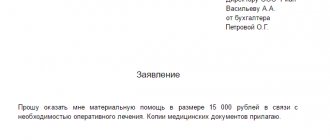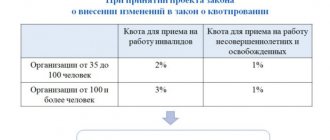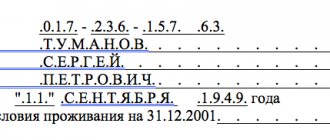Relatives of an employee who died as a result of an accident at work or an employee who died as a result of an occupational disease have the right to receive:
- one-time insurance payment – 1,000,000 rubles;
- monthly insurance payment in the amount of the average monthly earnings of the deceased.
The total amount of payments to relatives cannot exceed the maximum monthly insurance payment. In 2020 it is 74,097 rubles 66 kopecks.
Insurance payments are divided equally among all relatives entitled to receive them.
How long are benefits paid in the event of the death of the insured:
- minors - under 18 years of age;
- full-time students over 18 years of age - until completion of education (but not more than 23 years of age);
- for women and men after retirement – for life;
- for disabled people – for the period of disability*
- one of the parents, spouse or other family member who is not working and is caring for the deceased’s dependent children, grandchildren, brothers and sisters - until they reach the age of 14 years or their health status changes.
In case of untimely transfer of insurance payments, penalties in the amount of 0.5% of the amount of insurance payment for each day of delay must be paid.
https://youtu.be/1otBEfUgpIA
The process of applying for death benefits for a relative
To receive financial assistance, you must:
- Prepare documents. You will need to provide:
- Application for compensation.
- Applicant's passport.
- Death certificate of a citizen.
- Documents confirming relationship.
- Certificate of registration at the place of residence, an extract from the Pension Fund account of the deceased, pension certificate.
- Other documents upon request of the paying authority.
- Contact the relevant authorities. The collected documents must be submitted before the expiration of six months from the date of death of the citizen.
- Wait for payment. After submitting the necessary documents and checking them, a decision is made on the accrual of benefits.
In conclusion, we note that in order to process payments for the funeral of a relative, it is necessary to collect all the required documents and submit them to the necessary authority within six months from the date of death of the family member.
Organize a funeral Ask your question
Calculation of monthly insurance payment to relatives
The amount of the monthly insurance payment is calculated based on the employee’s average monthly earnings before the accident (the fact of acquiring an occupational disease) and the number of relatives (dependents) entitled to receive the payment.
Formula: the average monthly salary of an employee is divided by the number of applicants for payment.
When determining the average monthly earnings, all payments accrued to the employee before the occurrence of an accident or acquisition of an occupational disease (both at the main place of work and part-time), which were subject to contributions for insurance against industrial accidents and occupational diseases, for the last 12 months are taken into account. .
One-time payments (for example, compensation for unused vacation and severance pay upon dismissal) are not taken into account.
If an employee worked for less than 12 months before the occurrence of an accident or occupational disease, then his average monthly earnings are determined as follows: the amount of payments accrued to the employee for fully worked months preceding the month in which the accident or occupational disease occurred is divided by the number of months worked by the employee before the occurrence accident.
However, the total amount of payments to relatives cannot exceed the maximum monthly insurance payment. In 2020 it is 74,097 rubles 66 kopecks.
Insurance payments are divided among all relatives entitled to receive them on the day of death of the employee in equal shares.
Other benefits upon death of an employee entitled to close relatives
In addition to the basic payments discussed above, family members of a deceased employee may be entitled to other amounts. These include financial assistance from the employer. Relatives can apply for this payment only if the provision of additional funds is stated in the text of the collective agreement of the enterprise in which the employee worked, or another internal act
. The chance to receive financial assistance also appears if the employer personally offered assistance to the relatives of the deceased. Family members do not have the right to demand financial assistance from the deceased employee’s boss—it must be a voluntary gesture.
Another payment designed to help the relatives of the deceased financially is a funeral benefit. You need to know the following about this type of insurance:
- Perhaps the local act of the enterprise where the deceased worked contains a clause according to which the employer must pay the employee’s funeral expenses in an amount exceeding the amount of social benefits for funerals in the region.
- If there is no internal act with such provisions, relatives can only count on benefits in the amount in which it is established at the federal level. It is likely that the constituent entity of the Russian Federation also has a multiplying factor that will increase the final payment amount.
- The amount of the benefit increases annually due to the February indexation of payments. Until February 1, 2020, the amount of compensation is 5,701 rubles 31 kopecks (see clause 1, article 10 of Federal Law No. 8-FZ of January 12, 1996).
- Both citizens of the Russian Federation and foreign citizens temporarily or permanently residing in Russia have the right to receive social benefits for funerals.
Important!
It is necessary to submit documents for receiving social benefits no later than 6 months after the date of death of an employee of the organization, otherwise the employer has the right to refuse payment.
How long are insurance benefits paid in the event of the death of the insured:
- minors - under 18 years of age;
- full-time students over 18 years of age - until completion of education (but not more than 23 years of age);
- for women and men after retirement – for life;
- for disabled people – for the period of disability*
- one of the parents, spouse or other family member who is not working and is caring for the deceased’s dependent children, grandchildren, brothers and sisters - until they reach the age of 14 years or their health status changes.
In case of untimely transfer of insurance payments, penalties in the amount of 0.5% of the amount of insurance payment for each day of delay must be paid.
Where to apply for funeral benefits in various cases
Not in every case, relatives of the deceased should apply for social benefits for burial at the last place of work of the deceased family member. The table below provides explanations on this matter:
| Place of submission of documents for payment of funeral benefits | In what cases should you contact |
| At the place of work of the deceased (LLC or individual entrepreneur) | At the time of death, the person was employed in an organization or company of an individual entrepreneur. Relatives of deceased working pensioners should also contact the employer. |
| At the place of work of the parent of the deceased | In the event of the death of a minor child (natural, adopted) |
| Russian Pension Fund |
|
| Social protection bodies |
|
| Social Insurance Fund |
|
“The social protection authorities are entrusted with the functions of paying two types of benefits. The first is a social benefit for burial, and the second is the payment of one-time financial assistance associated with burial. Social benefits for non-burial are paid by social protection authorities if the deceased was not a pensioner and did not work. Pensioners receive a funeral benefit from the Pension Fund; if the deceased pensioner worked, then the funeral benefit is paid by the employer, as in the case if the deceased worked and was not a pensioner. Now, regarding the payment of financial assistance for funeral. (...) Financial assistance for funerals is not provided by the SZN authorities in all cases - this assistance is provided to low-income citizens. If a citizen living alone has died, then financial assistance for burial is paid to the low-income citizen living alone. If a citizen who lived in the family dies, then payment of financial assistance for funeral is carried out to one of the family members who applied for it, again based on the income of the entire family. Income is taken for the 3 months preceding the month of circulation. (...) The amount of financial assistance is a fixed amount; depending on income, it ranges from 4 to 9 thousand rubles. That is, the SZN Department is not obliged to fully reimburse expenses incurred by citizens.”
Svetlana Gennadievna Ionova, head of the department for ensuring social guarantees of the Sergiev Posad Department of Social Protection of the Population.
Deadlines for issuing money
The legislation establishes the terms in accordance with which the payment of wages to an employee is made.
You need to contact the head of the company within 4 months from the official date of death of the person. This rule is spelled out in paragraph 2 of Article 1183 of the Civil Code of the Russian Federation.
If a relative of a deceased person has provided all the necessary papers and completed an application for payment of wages, the money should be given to you within seven days. This is stated in Article 141 of the Labor Code of the Russian Federation.
If suddenly the employer is not contacted with such a statement, after four months after the death of the employee, the specified amount is included in the total inheritance mass in accordance with clause 3 of Article 1183 of the Civil Code of the Russian Federation.
After this, the employer must wait for the heirs to collect the deceased employee's wages.
The death of an employee does not mean that the enterprise where he worked is exempt from paying debts to him. The Labor Code of the Russian Federation provides for the payment of funds due to a deceased employee to his immediate relatives:
- spouse,
- parents, adoptive parents,
- children (including adopted children).
Funds can be given not only to the family of the deceased person, but also to dependent persons. The list of people who can be recognized as family members is established by the Family Code. To prove that a person is a dependent, you must apply to the court for a judgment.
Taxation and insurance premiums
Neither personal income tax nor insurance premiums are deducted from payments received in connection with the death of an employee , which is justified in the following regulations:
- pp. 3 p. 3 art. 44 of the Tax Code of the Russian Federation states that obligations to pay taxes and insurance premiums terminate in connection with the death of the taxpayer;
- pp. 8 clause 1 art. 217 of the Tax Code of the Russian Federation prohibits levying tax on funeral benefits, and clause 8 of the same article - on financial assistance paid by the employer of the deceased to his family;
- clause 18 art. 217 of the Tax Code of the Russian Federation - amounts received by inheritance are not subject to taxation (if wages and other payments passed into the inheritance estate and were received by relatives through a notary);
- pp. 1 clause 1 art. 422 of the Tax Code of the Russian Federation - a ban on collecting tax contributions from funeral benefits.
If personal income tax is withheld by mistake
Important! If an organization erroneously withheld personal income tax or insurance premiums from amounts due to relatives or dependents of a deceased employee, they must be returned to the applicant.
Organization, in accordance with Art. 78 of the Tax Code of the Russian Federation and Letter of the Ministry of Finance of Russia dated November 21, 2017 No. 03-04-06/77146, must contact the tax authority by submitting an application for a refund of overpaid tax. The returned 13% of personal income tax is transferred to relatives.
Author of the article
Pristromov Dmitry Alexandrovich
Works as a lawyer for more than 10 years. Since 2013 - Chief Legal Advisor of Sberbank PJSC. Consultant for the Narabote.me project
Articles written
110
about the author
Legislative acts on the topic “Payments upon death of an employee”
| Art. 141 Labor Code of the Russian Federation | On issuing payments to close relatives of a deceased employee |
| Art. 137 Labor Code of the Russian Federation | On the impossibility of deducting funds from the income of a deceased employee for unworked vacation days taken in advance |
| Art. 10 Federal Law of January 12, 1996 No. 8-FZ | About burial and funeral business (about payment of benefits at the place of work) |
| Art. 83 Labor Code of the Russian Federation | On termination of an employment contract with a deceased employee |
Payment procedure
Norm Art. 141 of the Labor Code of the Russian Federation states that it is necessary to pay the wages of a deceased employee , but payments are not limited to one salary.
According to the general rule of payments in connection with dismissal, the employee, in addition to salary, must also be paid compensation for unused vacation. This provision also applies in the event of death.
Funds are transferred to close relatives who submit the appropriate application to the head of the organization.
Sequencing
The payment algorithm itself is as follows:
- Drawing up an Order to terminate an employment contract and personnel documents.
This act is issued in the unified form T-8, but a company letterhead can also be used as a basis.
The main difference from the usual termination or termination of an employment relationship will be that the Order will not have the employee’s signature.
The date of dismissal is the day of the employee's death. The same applies to personnel documents (work book and personal card).
There is no need to require relatives to sign, but the employer may ask them to pick up the work book. In this case, relatives provide a written statement.
Reference. If none of the relatives come for the work book, the organization must store it together with the personal card for 75 years (Order of the Ministry of Culture of Russia dated August 25, 2010 No. 558).
- Receiving an application from the relatives of the deceased for payment of his salary.
Family members of a deceased employee must apply in writing to the head of the organization to receive his wages accrued until the employee’s death. More details about the procedure and deadlines are below.
The amount of money must be paid within 1 week from the moment the manager receives the application (Article 141 of the Labor Code of the Russian Federation).
- Calculation of payment.
As mentioned above, wage balances and compensation for unused vacation are accrued as payments, but provided that the employee did not go on vacation in advance until the end of the working year. In this case, the employer does not have the right to collect the amount of debt from relatives or withhold a percentage of the remaining salary (clause 4, part 2, article 137 of the Labor Code of the Russian Federation).
The salary includes all bonuses, additional payments (for example, for work at night or “for harmfulness”), allowances (for example, the northern coefficient, etc.).
In addition to the above payments, relatives of a deceased employee may be paid:
- temporary disability benefits (if an employee died while on sick leave) - issued only to family members with whom the deceased lived together;
- maternity benefits (for employment and child care), if the employee died during the specified leave;
- travel expenses if the employee died during a business trip;
- financial assistance to relatives, provided that such payment is provided for by local acts of the organization or a collective agreement.
Important! Also, the relatives of the deceased must be paid a funeral benefit. In accordance with Part 2 of Art. 10 Federal Law of January 12, 1996 No. 8, this payment is the responsibility of the employer.
For example, since February 2020, the amount, taking into account indexation, is 5,946 rubles 47 kopecks (Resolution of the Government of the Russian Federation of January 24, 2019 No. 32).
Deposit
If an employee who receives wages in person, that is, through the organization’s cash desk, and not to a bank account (card), but was unable to collect it for some reason, the amount must be deposited.
Depositing refers to the process of reflecting the salary in accounting as not received by the employee.
This also applies to the situation with deceased employees.
According to general rules, you can receive such a salary:
- on the day of the next issue;
- on a day specifically established by a local act of the organization as the period for receiving deposited salaries;
- upon the written application of the employee himself on the day specified by him (provided that such an amount is in the cash register).
The basis for issuing the deposited salary of a deceased employee is a written statement from his relatives. In this case, the general rule applies, according to which the amount must be issued within 1 week from the date of application.
Overdue
An employer who has not paid the deceased employee’s wages and compensation within 1 week from the date of receipt of the application will bear financial and administrative liability (Article 5.27 of the Code of Administrative Offenses of the Russian Federation).
Financial liability, in accordance with Art. 236, is to charge interest for each overdue day. The amount of the penalty cannot be less than 1/150 of the rate of the Central Bank of the Russian Federation.
To whom and when is it paid?
First of all, it is necessary to determine the list of persons who are entitled to receive payments for a deceased relative. First of all, close relatives can claim this right (Article 14 of the RF IC):
- spouse);
- children (natural or adopted);
- parents (adoptive parents);
- siblings;
- Grandmothers and grandfathers.
Other relatives (aunts or uncles, nephews, stepfather or stepmother, stepson or stepdaughter, etc.), in the absence of the above, also have the right to apply to the employer for payment.
In addition to relatives, his disabled dependents also apply for wages.
In accordance with Art. 1183 of the Civil Code of the Russian Federation, family members were required to live together with the deceased, while this rule did not apply to disabled dependents.
They may also be relatives of the deceased who lived separately but depended on his earnings, for example, disabled parents.
Labor legislation does not determine the priority.
Important! Practice advises employers to pay wages to the relative (dependent) who submitted the application first.
The employer is not obliged to somehow divide the payment amount between relatives if several applications are submitted.
Deadline
In accordance with paragraph 2 of Art. 1183 of the Civil Code of the Russian Federation, relatives who lived with a deceased employee or dependents have the right to contact the employer within 4 months from the date of death of the employee .
If an application was not submitted within this period, the employer, in accordance with paragraph 3 of Art. 1183 of the Civil Code of the Russian Federation, payments are transferred to the inheritance estate. The employer must transfer it to the notary's deposit.
Relatives who submitted an application after 6 months must also be sent to a notary, since the salary will now be issued not in order of priority (who filed the application first), but in the order of legal or testamentary inheritance.
Documents and application procedure
First of all, a written application is required from relatives or dependents. It is drawn up in writing and must contain all the information necessary for the employer to confirm the existence of a relationship (dependency of the applicant).
- Statement header.
The applicant must submit the application to the deceased's employer. Thus, the following are indicated:
- full name of the organization;
- Name and position of the manager.
It is also necessary to provide information about the applicant himself:
- FULL NAME;
- passport details;
- address and contact details.
- Main part.
In the main part, it is necessary to express a request to transfer wages and other amounts due that were not received by the employee (full name, position) due to death. You must also indicate:
- who is the applicant’s relationship to the deceased (with reference to a document confirming relationship/dependency, as well as with reference to a document confirming cohabitation);
- details to which the amount should be transferred.
- List of documents attached to the application.
The application must include a list of attached documents.
To confirm your rights you will need:
death certificate (court decision declaring a citizen dead);
- applicant's passport;
- a document confirming the relationship (birth certificate, marriage certificate, etc.);
- a document confirming that relatives live together (extract from the house register or a single housing document).
If, in addition to wages, the applicant requires a funeral benefit, the following must be attached to the documents:
- death certificate (not certificate) in form 33, issued by the registry office;
- a check or other document confirming payment for funeral services.
The application must contain the date of its submission and the signature of the applicant with a transcript.
How to reflect financial assistance in 2-NDFL
Local legislation may provide additional measures to support its citizens for the funeral of loved ones. So, for example, in the Krasnodar Territory such an additional benefit is paid to persons who took care of the burial, regardless of whether they receive federal benefits, and amounts to 1,500 rubles.
What to do in case of a fire If an employee and his family suffered from a fire, then the organization in which he operates can provide him with financial assistance in any amount. However, such payment will not be subject to income tax if the following conditions are met:
- The fact of force majeure must be confirmed by a certificate from the fire service of the Ministry of Emergency Situations of the Russian Federation.
- The amount of damage caused must first be assessed (Letter of the Ministry of Finance No. 03-03-06/4/85).
Important! In order for the management to make a positive decision, the employee must not only document the fact of death, but also provide official proof of close relationship with the deceased.
The amount of financial assistance for funeral is determined based on the fact of contacting social services. It is simply impossible to calculate its value in advance. As of January 1, 2020, it was 5,227 rubles. More accurate information can only be obtained upon registration.
Frequently asked questions about death benefits
Question #1:
In what amount is the employer obliged to pay the family of a deceased employee a funeral benefit - in the amount established on the date of the employee’s death or on the date of payment of the benefit?
This benefit is paid in the amount determined on the date of death of the employee.
Question #2:
Is it possible to apply to an employer for a funeral benefit if we are not talking about a company employee, but about a minor child of one of his subordinates?
Yes, employers are required to pay social benefits for funerals in three cases:
- If an employee of an enterprise (LLC or individual entrepreneur) dies.
- If an employee who is a working pensioner dies.
- If there is a death of a minor child of one of the employees.











